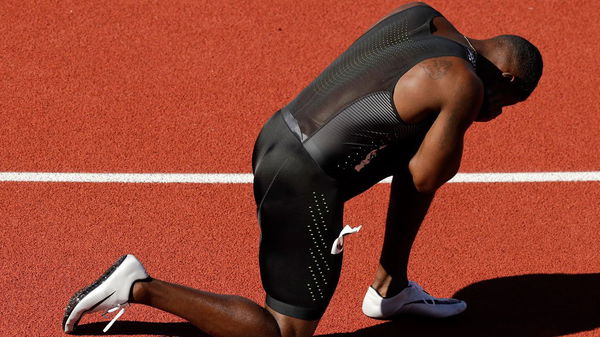

“People still hated on me all the way to the point of my retirement.” Shocking, isn’t it? To pour your heart into a sport, to climb the ranks, to stand at the pinnacle of the Olympic Games—and still be met with hate. For a track and field athlete, it’s not just about running fast or jumping far. It’s also about carrying the weight of expectations, scrutiny, and public perception. Now add: He had just claimed victory on the world’s biggest stage, basking in the glory that comes only once in a lifetime. But overnight, the cheers turned to silence, and the applause became whispers of doubt. And…
Fans who once chanted his name now questioned the athlete’s worth. Race organizers who had once celebrated his talent began quietly erasing him from the start lists. Because of an offense—an incident that lingered like a shadow, no matter how brightly he shined on the track. Still, Justin Gatlin didn’t quit. He trained harder. He showed up, even when the welcome was cold. Every race became a statement. Every finish line was a silent scream of defiance. And though the world may have tried to turn its back on him, he never turned his back on the sport. Until the very end, he ran. And 19 years later, he still remembers each of the days of his banned tenure. In an interaction today, Gatlin opened up about those days.
In an interaction with Meet The Mitchells, Justin said, “I’m thinking track is my whole life, my whole world. And then everything just goes dark, you know, so I’d have nowhere to go, nowhere to turn. And I’m still at that age where I’m still growing. Still trying to find myself as an adult.” The age Justin was talking about was 24 years, which is considered the most active age in track and field sports. Yet the former Olympic champion found himself away from the sport in those years. A huge loss, no? And because of the ban, he lost four years from his senior career. However, in 2001, he had walked through the same lane, coming under the scanner. But then, he was 19 years old. So, wasn’t it tough for him to return to the main path of track and field sports, accepting the changes?
ADVERTISEMENT
Article continues below this ad

ADVERTISEMENT
Article continues below this ad
Yes. Gatlin had a different kind of fight. He narrated it: “I learned how to navigate myself through life as a regular person that didn’t have the thing that he loved the most, which was track and field.” After his return in 2010, Gatlin showed his fresh form on tracks and earned several titles. But aren’t we missing the incidents that put the 4-time world champion under scrutiny?
The track and field sports legend was found guilty two times
Even after standing atop the Olympic podium, even after clawing his way back from exile—not once, but twice—Justin Gatlin could never outrun the shadow of his past. How? His first strike came early, in 2001, when he tested positive for an amphetamine found in medication he had taken since childhood to treat ADD. It was a technicality, one rooted in medical history, not malice. Still, it counted. However, after the appeal, it was reduced. Meanwhile, the world watched, and the whispers began. However, it was the second ban, in 2006, that truly stained his legacy. A four-year suspension from USADA for a second doping offense. Gatlin vanished from the track, cast out of the sport he loved. Some wrote him off. Others didn’t just doubt him—they despised him. Evidence?
ADVERTISEMENT
Article continues below this ad
What’s your perspective on:
Can we separate an athlete's past mistakes from their achievements? Justin Gatlin's story begs the question.
Have an interesting take?

via Getty
EUGENE, OREGON – JUNE 20: Justin Gatlin looks on after the Men’s 100 Meter Final on day 3 of the 2020 U.S. Olympic Track & Field Team Trials at Hayward Field on June 20, 2021 in Eugene, Oregon. (Photo by Patrick Smith/Getty Images)
In January this year, Gatlin said in a podcast, “They’ll sit and say, well, we don’t want Justin Gatlin in our race.” The word “they” explains those race organizers who didn’t want to see the athlete in their hosted events after the ban period. However, Justin decided to go on and remained true to the sport. And now, after 19 years, he has yet to forget those dark chapters.
ADVERTISEMENT
ADVERTISEMENT
ADVERTISEMENT
ADVERTISEMENT


Can we separate an athlete's past mistakes from their achievements? Justin Gatlin's story begs the question.